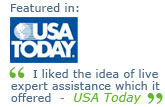Tax Deductions for Cooks

If you create culinary masterpieces for a living, you may receive some of your income as tips or bonuses, in addition to your regular salary. You must report your tips to your employer, and you can expect to find the amount reported in Box 1 of your Form W-2, Wage and Tax Statement. You're not required to report tips that total less than $20/month, however the funds are still taxable. The value of any non-cash compensation, such as gifts, tickets, or passes, must be included in your income when filing your tax return.
Tips allocated from your employer are shown in Box 8 of your W-2. These tips are separate from your regular wages and tips you reported. Allocated tips are common in the following situations:
- You work in a restaurant or longue that requires tips to be allocated
- Your reported tips are less than your share of 8% of all food and drink sales
Generally, you'll be required to report allocated tips on your tax return. You may be responsible for Medicare and Social Security taxes on allocated tips if not enough tax was withheld. You can use Form 4137, Social Security and Medicare Tax on Unreported Tip Income.
You may be able to reduce the amount of taxes you owe if you have unreimbursed job related expenses you can deduct. You'll need receipts to document the amount you spent on deductible expenses such as:
- Occupational or licensing fees
- Required medical exams that you pay out of pocket for
- Journal and trade publication subscriptions
- Cost and maintenance of required uniforms, as long as they are not suitable for everyday wear. Service uniforms typically count, but black pants and a white dress shirt are not deductible.



